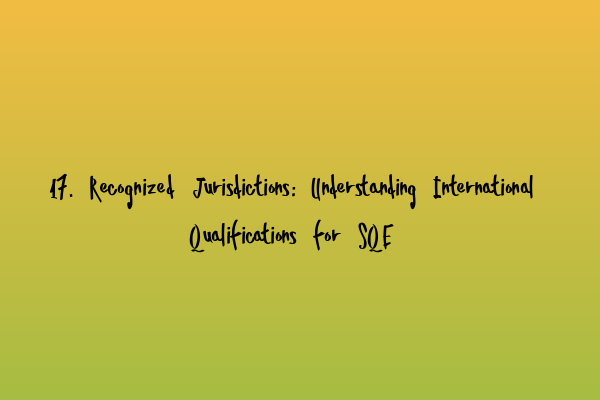Recognized Jurisdictions: Understanding International Qualifications for SQE
Are you considering taking the Solicitors Qualifying Examination (SQE) to pursue a legal career in the UK? One important aspect to understand is the recognition of international qualifications. As the SQE opens doors to legal practice in England and Wales, it is crucial to understand how your international qualifications may be recognized in the context of SQE. In this article, we will explore the concept of recognized jurisdictions and how they impact your eligibility to take the SQE.
What are recognized jurisdictions?
Recognized jurisdictions refer to countries and legal systems whose qualifications are deemed equivalent to those required to practice law in England and Wales. The Solicitors Regulation Authority (SRA), the regulatory body responsible for the SQE, has a list of recognized jurisdictions that have undergone a rigorous assessment process to determine the comparability of their legal education and training.
If you have obtained your legal qualifications in a recognized jurisdiction, it demonstrates that you have received a standard of legal education and training that meets the requirements set by the SRA. This recognition can streamline your path to becoming a solicitor in England and Wales.
How does recognition impact SQE eligibility?
If you have qualified in a recognized jurisdiction, you may be eligible to take the SQE without the need for further assessment of your qualifications. This means that your international qualifications are considered equivalent to the educational and training standards required by the SRA.
However, it is important to note that recognition does not automatically grant you exemption from the SQE. You will still need to meet other eligibility criteria, such as completing the necessary work experience and passing the SQE assessments. Nevertheless, having qualifications from a recognized jurisdiction can significantly simplify your journey towards becoming a solicitor in England and Wales.
How to determine if your jurisdiction is recognized
If you obtained your qualifications outside of the UK, you should check whether your jurisdiction is recognized by the SRA. The SRA’s website provides a comprehensive list of recognized jurisdictions, along with specific details about each jurisdiction’s recognition status and any additional requirements that may apply.
Before proceeding with the SQE, it is essential to verify the status of your jurisdiction to ensure that you meet the eligibility criteria. If your jurisdiction is not recognized, you may need to undertake further assessment or additional qualifications to demonstrate your competence to practice law in England and Wales.
It is worth noting that the list of recognized jurisdictions may be subject to occasional updates and revisions. Therefore, it is advisable to regularly check the SRA’s website for the most up-to-date information.
Conclusion
Understanding the concept of recognized jurisdictions and the impact on your eligibility for the Solicitors Qualifying Examination is crucial when considering a legal career in the UK. By having qualifications from a recognized jurisdiction, you can demonstrate the equivalence of your legal education and training, making the path to becoming a solicitor in England and Wales smoother. However, it is important to confirm the recognition status of your jurisdiction and ensure that you meet all other eligibility criteria to take the SQE.
If you want to explore more strategies to excel in the SQE, check out our related articles:
- SQE Strategies: Proven Tactics to Ace the Solicitors Qualifying Examination
- SQE Case Studies: Applying Knowledge in Real-Life Scenarios
- Solicitors Qualifying Examination (SQE): Your Gateway to Legal Practice
- Mastering Time Management in SQE: Strategies for Efficient Exam Completion
- Analyzing Mock Results for SQE: Identifying Areas of Improvement
Remember, the SQE is not only a test of legal knowledge but also a gateway to the legal profession. By understanding the requirements and utilizing effective strategies, you can enhance your chances of success in this important examination.
